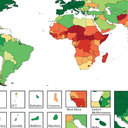Acquired immunodeficiency syndrome-associated renal disease in children.
Palabras clave
Abstracto
Five children with acquired immunodeficiency syndrome (AIDS) and clinically significant renal disease had detailed pathologic examination of renal tissue (biopsy specimens, autopsy specimens, or both). All patients had proteinuria, hypoalbuminemia, and edema; one patient had persistent azotemia. In two cases, renal disease was the first manifestation of human immunodeficiency virus (HIV) infection. All patients had progressive renal disease, and four of the five died. Pathologic studies revealed focal glomerulosclerosis and mesangial proliferative glomerulonephritis with deposits of immunoglobulins and complement demonstrated by immunofluorescence and electron microscopy. Characteristic tubuloreticular structures were also demonstrated in the glomerular endothelial or epithelial cells in two cases. Renal disease is part of the multisystem involvement in children with AIDS. The pathogenesis of renal disease is not known, but circulating immune complexes are known to occur in children with HIV infection and may be involved.


